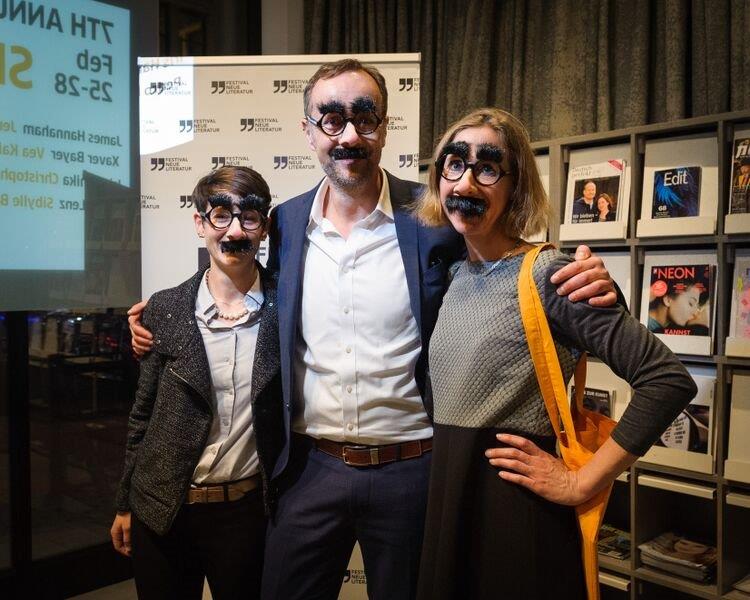By Ross Benjamin
As curator of last year’s Festival Neue Literatur – an annual three-day festival in New York City that brings together German, Austrian, Swiss and American writers for a series of conversations and readings – I chose the theme ‘Seriously Funny’. By highlighting the wide range of approaches to literary humour among the featured authors, I sought not only to challenge a certain stereotype of German-language literature as particularly humourless, grim, or heavy, but also to draw attention to strains of humour that might be less immediately perceptible to Anglo-American sensibilities. These have little to do with anaesthetic entertainment. On the contrary, the festival focused on how the participants’ writing uses humour to grapple with serious subjects.
The festival’s events – all held in English – showcased six works of contemporary German-language fiction and two recent American novels that explore profound truths by conveying funny or absurd aspects of human predicaments and relationships: Geheimnisvolles Knistern aus dem Zauberreich (‘Mysterious Crackling from the Magic Realm’), Austrian writer Xaver Bayer’s collection of at once quotidian and surreally imaginative prose miniatures; Der Tag, als meine Frau einen Mann fand (‘The Day My Wife Found A Husband’), Swiss writer Sibylle Berg’s unflinching account of the collapse of a married couple’s seemingly stable bourgeois existence; Wie der Müll geordnet wird (‘How The Trash Gets Sorted’), German writer Iris Hanika’s formally experimental exploration of the breakdown of meaning in post-Wall Berlin; Delicious Foods, American writer James Hannaham’s harrowing chronicle of a family torn apart by racism, drug addiction, and human trafficking; Blasmusikpop (‘Brass Band Pop’), Austrian writer Vea Kaiser’s satire of provincial life in an isolated Austrian mountain village; Meistens Alles Sehr Schnell (published in an English translation by Aaron Kerner as Almost Everything Very Fast), German writer Christopher Kloeble’s Bavarian family saga about a young man’s search for his birth mother; Der Goalie bin ig (published in an English translation by Donal McLaughlin as Naw Much of a Talker), Swiss writer Pedro Lenz’s story of a Swiss ex-con trying to find his place in the world; and Dept. of Speculation, American writer Jenny Offill’s mordant portrait of a marriage in crisis.
Over the course of the festival, it became clear that none of the writers regarded the humour of their work as an added ingredient, as something sprinkled in here and there; rather, it was integral to the texture of their writing, inseparable from their overall way of seeing and depicting the world. Their readings and panel discussions brought to light the many forms that humour can take besides mere escapism: it can be a wake-up call, a life raft, a safety valve, a shock absorber, a weapon, or a salve. It can sound an alarm or come to our aid in the face of the unmasterable and incomprehensible.
If the German-language literary tradition has something to teach us about humour, it is precisely its power to illuminate our condition and even to help us confront, navigate, and come to terms with pain, suffering, and trauma. What’s funny, for example, in the work of Friedrich Nietzsche, Thomas Mann, Franz Kafka, Joseph Roth, or Thomas Bernhard is always what’s irremediably, forsakenly, corruptibly human. In the English-speaking world, we perhaps tend to be less susceptible to this existentially poignant humour, which might partly account for the prevailing perception evident most recently in much of the Anglo-American praise for the 2016 German comedy Toni Erdmann, in which there was a detectable tone of surprise at the notion that a German film could be funny.
Nonetheless, as the work of the festival’s American participants demonstrates, such currents of humour are not confined to any single literature in isolation. That’s why the transnational character of Festival Neue Literatur was ultimately crucial to broadening and deepening the conversation about the interdependence of literary humour and seriousness. By revealing tendencies and concerns that figure prominently in German-language literature, the festival brought to the fore their presence and potency in American fiction too.
Nietzsche said that humans alone laugh because we alone suffer so deeply that we had to invent laughter. Writing that makes us laugh can wake us up to the urgent quandaries and complexities of our lives. Festival Neue Literatur’s excitingly intercultural exchange on the theme of humour testified to Walter Benjamin’s praise of laughter as a trigger for thinking, and it showed that this ‘convulsion of the diaphragm’, as Benjamin puts it, is conducive not only to that of the mind but also to that of the heart.


